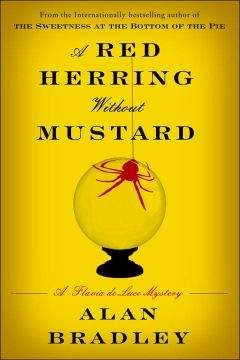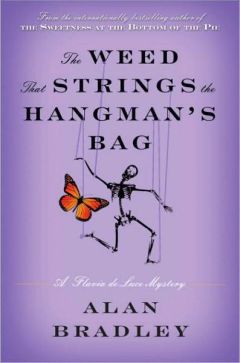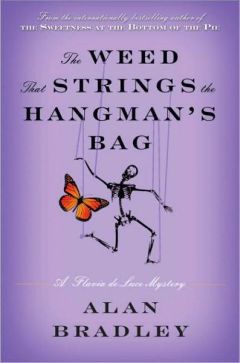Alan Bradley - A Red Herring Without Mustard: A Flavia de Luce Novel

Скачивание начинается... Если скачивание не началось автоматически, пожалуйста нажмите на эту ссылку.
Жалоба
Напишите нам, и мы в срочном порядке примем меры.
Описание книги "A Red Herring Without Mustard: A Flavia de Luce Novel"
Описание и краткое содержание "A Red Herring Without Mustard: A Flavia de Luce Novel" читать бесплатно онлайн.
I was suffocating, fighting for breath, my lungs filled with the sharp earthy smell of the potatoes that had recently occupied the sack. I could feel the blood rushing to my head.
Damn! I should have thought sooner of kicking them. Too late now.
“Make all the noise you want,” hissed a second voice. “There’s no one here to save you.”
With a sinking feeling I realized that this was true. Father had gone up to London to a philatelic auction, and Dogger had gone with him to shop for secateurs and boot polish.
The idea of burglars inside Buckshaw was unthinkable.
That left Daffy and Feely.
In an odd way I wished it had been burglars.
I recalled that in the entire house there was only one doorknob that squeaked: the door to the cellar stairs.
It squeaked now.
A moment later, like a shot deer, I was being hoisted up onto the shoulders of my captors and roughly borne, headfirst, down into the cellars.
At the bottom of the stairs they dumped me heavily onto the flagstones, banging my elbow, and I heard my own voice shrieking with pain as it came echoing back from the vaulted ceilings—followed by the sound of my own ragged breathing.
Someone’s shoes shifted in the grit not far from where I lay sprawled.
“Pray silence!” croaked a hollow voice, which sounded artificial, like that of a tin robot.
I let out another shriek, and I’m afraid I might even have whimpered a little.
“Pray silence!”
Whether it was from the sudden shock or the clammy coldness of the cellars I could not be certain, but I had begun to shiver. Would they take this as a sign of weakness? It is said that in certain small animals it is instinctive when in danger to play dead, and I realized that I was one of them.
I took shallow breaths and tried not to move a muscle.
“Free her, Garbax!”
“Yes, O Three-Eyed One.”
It sometimes amused my sisters to slip suddenly into the roles of bizarre alien creatures: creatures even more bizarre and alien than they were already in everyday life. Both of them knew it was a trick that for some reason I found particularly upsetting.
I had already learned that sisterhood, like Loch Ness, has things that lurk unseen beneath the surface, but I think it was only now that I realized that of all the invisible strings that tied the three of us together, the dark ones were the strongest.
“Stop it, Daffy. Stop it, Feely!” I shouted. “You’re frightening me.”
I gave my legs a couple of convincing froglike kicks, as if I were on the verge of a seizure.
The sack was suddenly whisked away, spinning me round so that I now lay facedown upon the stones.
A single candle, stuck to the top of a wooden cask, flickered fitfully, its pale light sending dark shapes dancing everywhere among the stone arches of the cellar.
As my eyes became accustomed to the gloom, I saw my sisters’ faces looming grotesquely in the shadows. They had drawn black circles round their eyes and their mouths with burnt cork, and I understood instantly the message that this was intended to convey: “Beware! You are in the hands of savages!”
Now I could see the cause of the distorted robot voice I had heard: Feely had been speaking into the mouth of an empty cocoa tin.
“ ‘French jet is nothing but glass,’ ” she spat, chucking the tin to the floor where it fell with a nerve-wracking clatter. “Your very words. What have you done with Mummy’s brooch?”
“It was an accident,” I whined untruthfully.
Feely’s frozen silence lent me a bit of confidence.
“I dropped it and stepped on it. If it were real jet it mightn’t have shattered.”
“Hand it over.”
“I can’t, Feely. There was nothing left but little chips. I melted them down for slag.”
Actually, I had hit the thing with a hammer and reduced it to black sand.
“Slag? Whatever do you want with slag?”
It would be a mistake to tell her that I was working on a new kind of ceramic flask, one that would stand up to the temperatures produced by a super-oxygenated Bunsen burner.
“Nothing,” I said. “I was just mucking about.”
“Oddly enough, I believe you,” Feely said. “That’s what you pixy changelings do best, isn’t it? Muck about?”
My puzzlement must have been evident on my face.
“Changelings,” Daffy said in a weird voice. “The pixies come in the night and steal a healthy baby from its crib. They leave an ugly shriveled changeling like you in its place, and the mother desolate.”
“If you don’t believe it,” Feely said, “go stand in front of a looking glass.”
“I’m not a changeling,” I protested, my anger rising. “Harriet loved me more than she did either of you two morons!”
“Did she?” Feely sneered. “Then why did she used to leave you sleeping in front of an open window every night, hoping that the pixies would bring back the real Flavia?”
“She didn’t!” I shouted.
“I’m afraid she did. I was there. I saw. I remember.”
“No! It’s not true.”
“Yes, it is. I used to cling to her and cry, ‘Mummy! Mummy! Please make the pixies bring back my baby sister.’ ”
“Flavia? Daphne? Ophelia?”
It was Father!
His voice came at parade-square volume from the direction of the kitchen staircase, amplified by the stone walls and echoing from arch to arch.
All three of our heads snapped round just in time to see his boots, his trousers, his upper body, and finally his face come into sight as he descended the stairs.
“What’s the meaning of this?” he asked, peering round at the three of us in the near-darkness. “What have you done to yourselves?”
With the backs of their hands and their forearms, Feely and Daffy were already trying to scrub the black markings from their faces.
“We were only playing Prawns and Trivets,” Daffy said before I could answer. She pointed accusingly at me. “She gives us jolly good what-for when it’s her turn to play the Begum, but when it’s ours she always …”
Well done, Daff, I thought. I couldn’t have concocted a better spur-of-the-moment excuse myself.
“I’m surprised at you, Ophelia,” Father said. “I shouldn’t have thought …”
And then he stopped, unable to find the required words. There were times when he seemed almost—what was it … afraid? … of my oldest sister.
Feely rubbed at her face, smearing her cork makeup horribly. I nearly laughed out loud, but then I realized what she was doing. In a bid for sympathy, she was spreading the stuff to create dark, theatrical circles under her eyes.
The vixen! Like an actress applying her makeup onstage, it was a bold and brazen performance, which I couldn’t help admiring.
Father looked on in thrall, like a man fascinated by a cobra.
“Are you all right, Flavia?” he said at last, not budging from his position on the third step from the bottom.
“Yes, Father,” I said.
I was going to add “Thank you for asking” but I stopped myself just in time. I didn’t want to overdo it.
Father looked slowly from one of us to another with his sad eyes, as if there were no words left in the world from which to choose.
“There will be a parley at seven o’clock,” he said at last. “In the drawing room.”
With a final glance at each of us, he turned and trudged slowly up the stairs.
“The thing of it is,” Father was saying, “you girls just don’t seem to understand …”
And he was right: We no more understood his world than he did ours.
His was a world of confetti: a brightly colored universe of royal profiles and scenic views on sticky bits of paper; a world of pyramids and battleships, of rickety suspension bridges in far-flung corners of the globe, of deep harbors, lonely watchtowers, and the heads of famous men. In short, Father was a stamp collector, or a “philatelist,” as he preferred to call himself, and to be called by others.
His every waking moment was spent in peering through a magnifying lens at paper scraps in an eternal search for flaws. The discovery of a single microscopic crack in a printing plate, which had resulted in an unwanted hair on Queen Victoria’s chin, could send him into raptures.
First would come the official photograph, and elation. He would bring out of storage, and set up on its tripod in his study, an ancient plate camera with a peculiar attachment called a macroscopic lens, which allowed him to take a close-up of the specimen. This, when developed, would produce an image large enough to fill an entire page of a book. Sometimes, as he fussed happily over these operations, we would catch snatches of H.M.S. Pinafore or The Gondoliers drifting like fugitives through the house.
Then would come the written paper which he would submit to The London Philatelist or suchlike, and with it would come a certain crankiness. Every morning Father would bring to the breakfast table reams of writing paper which he would fill, page after laborious page, with his minuscule handwriting.
For weeks he would be unapproachable, and would remain so until such time as he had scribbled the last word—and more—on the topic of the queen’s superfluous whisker.
Once, when we were lying on the south lawn looking up into the blue vault of a perfect summer sky, I had suggested to Feely that Father’s quest for imperfections was not limited to stamps, but was sometimes expanded to include his daughters.
“Shut your filthy mouth!” she’d snapped.
“The thing of it is,” Father repeated, bringing me back to the present, “you girls don’t appear to understand the gravity of the situation.”
Mainly he meant me.
Feely had ratted, of course, and the story of how I had vaporized one of Harriet’s dreadful Victorian brooches had come tumbling out of her mouth as happily as the waters of a babbling brook.
“You had no right to remove it from your mother’s dressing room,” Father said, and for a moment his cold blue stare was shifted to my sister.
“I’m sorry,” Feely said. “I was going to wear it to church on Sunday to impress Dieter. It was quite wrong of me. I should have asked permission.”
It was quite wrong of me? Had I heard what I thought I’d heard, or were my ears playing hob with me? It was more likely that the sun and the moon should suddenly dance a jolly jig in the heavens than that one of my sisters should apologize. It was simply unheard of.
The Dieter Feely had mentioned was Dieter Schrantz, of Culverhouse Farm, a former German prisoner of war who had chosen to remain behind in England after the armistice. Feely had him in her sights.
“Yes,” Father said. “You should have.”
As he turned his attention to me, I could not help noticing that the folds of skin at the outer corners of his hooded eyes—those folds that I so often thought of as making him look so aristocratic—were hanging more heavily than usual, giving him a look of deeper sadness than I had ever seen.
“Flavia,” he said in a flat and weary voice that wounded me more than a pointed weapon.
“Yes, sir?”
“What is to be done with you?”
“I’m sorry, Father. I didn’t mean to break the brooch. I dropped it and stepped on it by accident, and it just crumbled. Gosh, it must have been very old to be so brittle!”
He gave an almost imperceptible wince, followed instantly by one of those looks that meant I had touched upon a topic that was not open for discussion. With a long sigh he shifted his gaze to the window. Something in my words had sent his mind fleeing to safety beyond the hills.
“Did you have an enjoyable trip up to London?” I ventured. “To the philatelic exhibition, I mean?”
The word “philatelic” drew him back quickly.
“I hope you found some decent stamps for your collection.”
He let out another sigh: this one frighteningly like a death rattle. “I did not go to London to buy stamps, Flavia. I went there to sell them.”
Even Feely gasped.
“Our days at Buckshaw may be drawing to a close,” Father said. “As you are well aware, the house itself belonged to your mother, and when she died without leaving a will …”
He spread his hands in a gesture of helplessness that reminded me of a stricken butterfly.
He had deflated so suddenly in front of us that I could scarcely believe it.
“I had hoped to take her brooch to someone whom I know …”
For quite a few moments his words did not register.
I knew that in recent years the cost of maintaining Buckshaw had become positively ruinous, to say nothing of the taxes and the looming death duty. For years Father had managed to keep “the snarling taxmen,” as he called them, at bay, but now the wolves must be howling once again on the doorstep.
There had been hints from time to time of our predicament, but the threat had always seemed unreal: no more than a distant cloud on a summer horizon.
I remembered that for a time, Father had pinned his hopes on Aunt Felicity, his sister who lived in Hampstead. Daffy had suggested that many of his so-called “philatelic jaunts” were, in fact, calls upon Aunt Felicity to touch her for a loan—or to beg her to fork over whatever remained of the family jewels.
In the end, his sister must have turned him down. Just recently, and with our own ears, we had heard her tell him he must think about selling his philatelic collection. “Those ridiculous postage stamps,” she had called them, to be precise.
“Something will turn up,” Daffy remarked brightly. “It always does.”
“Only in Dickens, Daphne,” Father said. “Only in Dickens.”
Daffy had been reading David Copperfield for the umpteenth time. “Boning up on pawnshops,” she had answered when I asked her why.
Only now did it occur to me that Father had intended to take Harriet’s brooch—the one I had destroyed—to a pawnbroker.
“May I be excused?” I asked. “I’m suddenly not feeling well.”
It was true. I must have fallen asleep the instant my head touched the pillow.
Now, hours later, I was suddenly awake. The hands of my alarm clock, which I had carefully dabbed with my own formulation of phosphorescent paint, told me that it was several minutes past two in the morning.
I lay in bed watching the dark shadows of the trees as they twitched restlessly on the ceiling. Ever since a territorial dispute between two of my distant ancestors had ended in a bitter stalemate—and a black line painted in the middle of the foyer—this wing of the house had remained unheated. Time and the weather had taken their toll, causing the wallpaper of nearly every room—mine was mustard yellow with scarlet worms—to peel away in great sheets which hung in forlorn flaps, while the paper from the ceilings hung down in great loose swags whose contents were probably best not thought about.
Sometimes, especially in winter, I liked to pretend that I lived beneath an iceberg in an Arctic sea; that the coldness was no more than a dream, and that when I awoke, there would be a roaring fire in the rusty fireplace and hot steam rising from the tin hip-bath that stood in the corner behind the door.
Подписывайтесь на наши страницы в социальных сетях.
Будьте в курсе последних книжных новинок, комментируйте, обсуждайте. Мы ждём Вас!
Похожие книги на "A Red Herring Without Mustard: A Flavia de Luce Novel"
Книги похожие на "A Red Herring Without Mustard: A Flavia de Luce Novel" читать онлайн или скачать бесплатно полные версии.
Мы рекомендуем Вам зарегистрироваться либо войти на сайт под своим именем.
Отзывы о "Alan Bradley - A Red Herring Without Mustard: A Flavia de Luce Novel"
Отзывы читателей о книге "A Red Herring Without Mustard: A Flavia de Luce Novel", комментарии и мнения людей о произведении.






